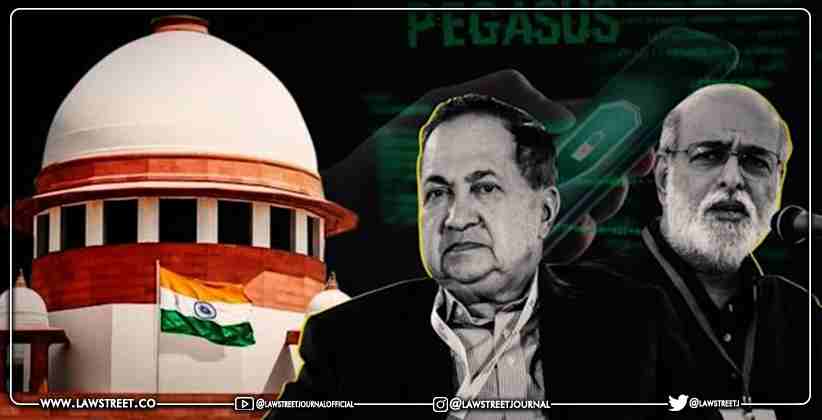Senior Journalists N Ram and Sashi Kumar have approached the Supreme Court seeking direction for independent inquiry headed by a sitting or retired judge of the Supreme Court to probe into the allegations that illegal surveillance has been carried out on inter alia journalists, lawyers, government ministers, opposition politicians and civil society activists using the Pegasus spyware.
The petitioners submitted that the global investigation involving several leading publications around the world has revealed that more than 142 persons including journalists, lawyers, government ministers, opposition politicians, constitutional functionaries and civil society activists from India have been identified as potential targets for surveillance using Pegasus spyware.
The petitioners also seek a direction to the Union Government of India to disclose if the Government of India or any of its agencies have obtained license for Pegasus software and employed it either directly or indirectly, to conduct surveillance in any manner. According to the petitioners the forensic analysis of several mobile phones belonging to persons targeted for surveillance by the Security Lab of Amnesty International have confirmed Pegasus-induced security breaches.
The petition has been preferred mainly on the following grounds:
- The targeted surveillance using military-grade spyware is an unacceptable violation of the right to privacy which has been held to be a fundamental right under Articles 14, 19 and 21 by Supreme Court in K.S. Puttaswamy v. Union of India (2017) 10 SCC 1. The use of the Pegasus spyware to conduct surveillance represents a grossly disproportionate invasion of the right to privacy. The Pegasus hack is a direct attack on communicational, intellectual and informational privacy, and critically endangers the meaningful exercise of privacy in these contexts.
- The targeted hacking/interception of inter alia journalists, doctors, lawyers, civil society activists, government ministers and opposition politicians seriously compromise the effective exercise of the fundamental right to free speech and expression under Article 19(1)(a). It has an obvious chilling effect on expression by threatening invasion into the most core and private aspects of a persons life.
- Legal regime for surveillance under Section 5(2) of the Telegraph Act has been completely bypassed in the present case. Surveillance/interception is justified only in cases of public emergency or in the interests of public safety, and the existence of such conditions must be inferred reasonably and cannot be determined solely on the assessment of the government. Neither of these mandatory conditions have been met in the present case, rendering the surveillance wholly illegal.
- The hack occasioned by the Pegasus spyware constitutes a criminal offence punishable under inter alia Section 66 (computer related offences), 66B (punishment for dishonestly receiving stolen computer resource or communication device), 66E (punishment for violation of privacy) and 66F (punishment for cyberterrorism) of the IT Act, punishable with imprisonment and/or fine. The attack prima facie constitutes an act of cyber-terrorism that has several grave political and security ramifications, especially considering that the devices of government ministers, senior political figures and constitutional functionaries which may contain sensitive information that have been targeted.
This is the third writ petition filed in the Supreme Court on Pegasus Spyware issue. Earlier, Advocate ML Sharma and Rajya Sabha MP John Brittas had filed PILs.








